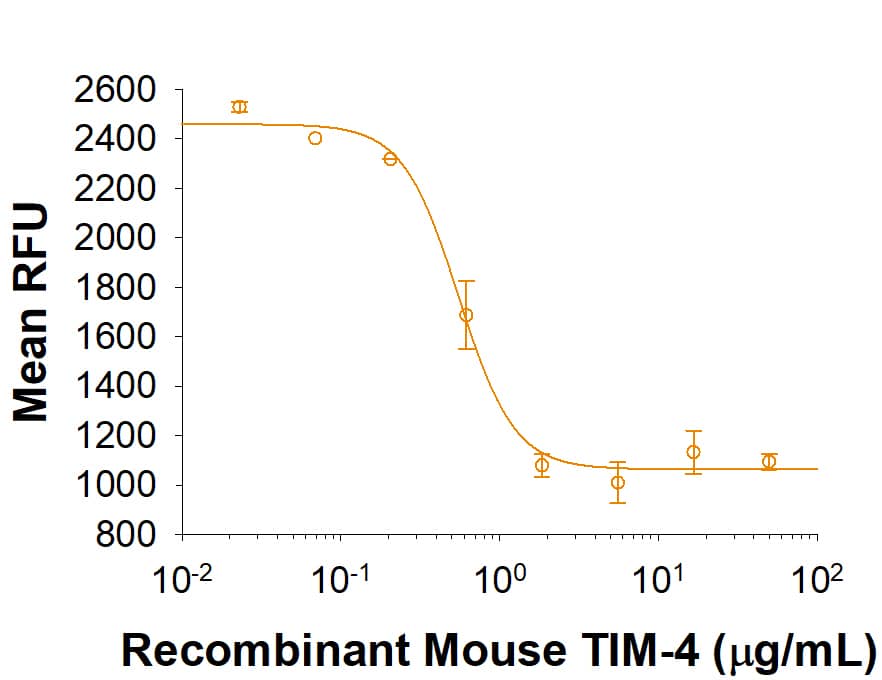Recombinant Mouse TIM-4 Protein, CF
R&D Systems, part of Bio-Techne | Catalog # 2826-TI

Key Product Details
Product Specifications
Source
Ala22-Thr279, with a C-terminal 6-His tag
Purity
Endotoxin Level
N-terminal Sequence Analysis
Predicted Molecular Mass
SDS-PAGE
Activity
Human T lymphocytes cultured for 72 hours with PHA were incubated for an additional 3 days in 96 well plates coated with 500 ng/mL anti-CD3 and rmTIM-4.
The ED50 for this effect is 0.25-1 µg/mL.
Optimal dilutions should be determined by each laboratory for each application.
Scientific Data Images for Recombinant Mouse TIM-4 Protein, CF
Recombinant Mouse TIM-4 Protein Bioactivity
Recombinant Mouse TIM-4 (Catalog # 2826-TI) inhibits anti-CD3-induced proliferation of stimulated human T cells. Human T cells cultured for 72 hours with PHA are incubated for an additional 3 days in 96 well plates coated with 500 ng/mL anti-CD3 and rmTIM-4. The ED50 for this effect is 0.25-1 µg/mL.Formulation, Preparation and Storage
2826-TI
| Formulation | Lyophilized from a 0.2 μm filtered solution in PBS. |
| Reconstitution |
Reconstitute at 100 μg/mL in sterile PBS.
|
| Shipping | The product is shipped at ambient temperature. Upon receipt, store it immediately at the temperature recommended below. |
| Stability & Storage | Use a manual defrost freezer and avoid repeated freeze-thaw cycles.
|
Background: TIM-4
TIM-4 (T cell; immunoglobulin; mucin-4), also known as SMUCKLER, is a 60 kDa member of the TIM family of immune regulating proteins. TIMs are type I transmembrane proteins with one Ig-like V domain and one Ser/Thr-rich mucin domain (1 - 3). The mouse TIM-4 cDNA encodes a 343 amino acid (aa) precursor that includes a 22 aa signal sequence, a 257 aa extracellular domain (ECD), a 21 aa transmembrane segment, and a 43 aa cytoplasmic tail (4). Structurally, TIM-4 is distinguished from other TIMs by the presence of an RGD motif in its Ig domain and the lack of a site for tyrosine phosphorylation in its cytoplasmic tail. The mucin domain in TIM-4 is larger than in TIM-1, -2, or -3. Within the ECD, mouse TIM-4 shares 27 - 33% aa sequence identity with mouse TIM-1, -2, and -3. The ECD of mouse TIM-4 shares 45% aa sequence identity with that of human and rat TIM-4. TIM-4 is expressed by macrophages and mature dendritic cells but not by lymphocytes (4, 5). TIM-4 binds specifically to TIM-1 which is also the cellular receptor for hepatitis A virus and has been implicated in the development of asthma (5 - 7). Among hematopoietic cells, TIM-1 is expressed on activated B and T cells, preferentially in the Th2 subset of CD4+ T cells (5, 8). The interaction ofTIM-4 with TIM-1 induces co-stimulatory and hyperproliferative signals in T cells (5).
References
- Kuchroo, V.K. et al. (2003) Nat. Rev. Immunol. 3:454.
- Mariat, C. et al. (2005) Phil. Trans. R. Soc. B 360:1681.
- Meyers, J.H. et al. (2005) Trends Mol. Med. 11:362.
- Shakhov, A.N. et al. (2004) Eur. J. Immunol. 34:494.
- Meyers, J.H. et al. (2005) Nat. Immunol. 6:455.
- Feigelstock, D. et al. (1998) J. Virol. 72:6621.
- McIntire, J.J. et al. (2001) Nat. Immunol. 2:1109.
- Khademi, M. et al. (2004) J. Immunol. 172:7169.
Long Name
Alternate Names
Gene Symbol
UniProt
Additional TIM-4 Products
Product Documents for Recombinant Mouse TIM-4 Protein, CF
Product Specific Notices for Recombinant Mouse TIM-4 Protein, CF
For research use only
